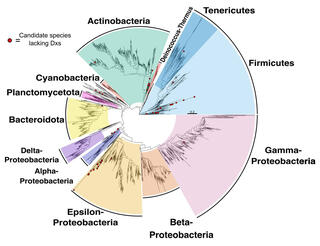Study reveals potential detours to bottlenecks in microbial terpenoid production

Background/Objective
To inform options for engineering microbial terpenoid production from plants by identifying potential alternative enzymatic routes that could circumvent bottlenecks in the bacterial methylerythritol phosphate (MEP) pathway, which generates terpenoid precursor molecules.
Approach
Researchers surveyed a database of 4,400 diverse bacterial genomes, using comparative genomics to identify orthologs of MEP and mevalonate pathway genes. In particular, they looked for alternatives to circumvent the IspG and IspH enzymes, which pose known engineering constraints, or to Dxs, for which some alternatives exist.
Results
Some bacteria appear to have evolved alternatives to Dxs, suggesting evolutionary flexibility at this step. There were no compelling candidates for alternatives to IspG or IspH. Phylogenetic analysis of MEP protein sequences suggest horizontal gene transfer may have played a role in the evolution of this pathway across bacteria.
Significance/Impacts
Terpenoids have wide-ranging uses including industrial solvents, pharmaceuticals, and fragrances. Despite efforts to enable sustainable production through microbial engineering, industrial production still largely relies on non-renewable petroleum sources. This work identifies an early step in the biosynthesis pathway as a possible alternative enzymatic route.